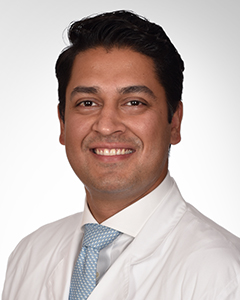By Tim Barker

As the emergency room doctors eased him to sleep, Carsten Kieffer was convinced he’d wake up the next morning without his right arm.
It’s easy to understand why the Leesburg man would think that way. The veteran firefighter and paramedic has witnessed his share of gruesome injuries over the years. Now, here he was at Orlando Health Orlando Regional Medical Center (ORMC) after a massive alligator mauled him in Lake Jessup.
The day started like so many others for Kieffer and his hunting buddy. They’d already snagged their first gator of the day when they came across a 12-footer in a shallow canal. But after hooking the creature, the gator launched into the boat and latched its jaws around Kieffer’s right arm.
“I was just in the wrong place at the wrong time,” says Kieffer, 42. “He didn’t come after me. He was just lunging to get out.”
The thrashing gator lifted Kieffer into the air, cracking bones in his arm. Then, for reasons unknown, it released him and fled.
When the ambulance arrived, both Kieffer and his friend, who also is a paramedic, insisted that he be transported to the Level One Trauma Center at Orlando Health ORMC.
“It’s where the top surgeons are. It’s a teaching hospital. I knew it was where I could get the best treatment,” says Kieffer, a father of two. “I told the guys all the information they needed, and then I asked them very politely to knock me out.”
Trying To Save the Arm
As Kieffer would later learn, most of those gathered in the operating room that night shared his pessimistic outlook on his arm’s future.
Greeting him in the emergency room was Dr. Karan Desai, who specializes in hand, upper extremity and microvascular surgery for the Orlando Health Jewett Orthopedic Institute. It’s a night Dr. Desai says he will remember for the rest of his life: “It was my first day on the job at Orlando Health.”
With such severe injuries to an extremity, amputation is often the outcome. Dr. Desai understood that Kieffer’s career as a firefighter would be over if the arm was lost. But more than anything, he wanted to be sure there was no hope before taking the arm.
“There are a lot of things we can do to reconstruct bones, tendons and muscles that can lead to relatively good function,” he says. “Amputation should be a last resort.”
Six hours later – with two major nerves in the arm still intact – Dr. Desai walked out of the operating room optimistic about Kieffer’s chances.
‘Exotic Animal’
In some ways, alligator attacks fall into their own special category of trauma. There’s the initial damage, which in Kieffer’s case involved badly mangled bones and torn flesh. But that’s only the beginning of potential problems.
Infection, particularly if it gets into those damaged bones, can be the most dangerous part of the treatment equation.
“We’re talking about an exotic animal that lives in a swamp. The last few gator bites I’ve heard about have led to amputations just because they could never clear the infection,” Dr. Desai says.
To fight the infection, he started by thoroughly cleaning the wound. He took Kieffer back into the operating room several times during that first week to clear up trouble spots.
But he also pulled in infection disease experts from Orlando Health Medical Group Infectious Diseases to guide the successful antibiotics treatment.
Model Patient
When Kieffer woke up the morning after the first of his five surgeries, his arm was intact – and he was able to twitch his fingers. If he could do that, he was convinced he’d be back at work sooner or later.
Dr. Desai’s initial assessment was less enthusiastic.
“He says, ‘If we can get you to lift and drink out of a glass of water with that hand, that’s a good goal,’ ” Kieffer recalls. “But I wasn’t ready to accept that.”
The last few gator bites I’ve heard about have led to amputations just because they could never clear the infection. – Dr. Karan Desai, Orthopedic surgeon
Kieffer quickly asked to have his pain meds cut and started walking around the floor with the help of his wife, Maja Kieffer. By the time his hospital journey – including 11 days in intensive care – was over, he was ready to tackle physical therapy and rehab.
“The first day I came home, I told my wife I was going to drink a glass of water with my ‘gator’ hand,” he says. “It wasn’t pretty. But I did it.”
By April, he was back at work full time.
Today, Dr. Desai remembers that initial assessment and why it turned out to be so far off. It was based on the outlook for the average patient.
“With these sorts of injuries, it’s a team approach. I have to do my part. But the patient has to do their part in the rehabilitation,” he says. “His perseverance as a patient I will never forget. He’s sort of like the model patient in my mind because of how hard he worked to get where he is today.”
Choose to Stay in Touch
Sign up to receive the latest health news and trends, wellness & prevention tips, and much more from Orlando Health.
Sign Up










